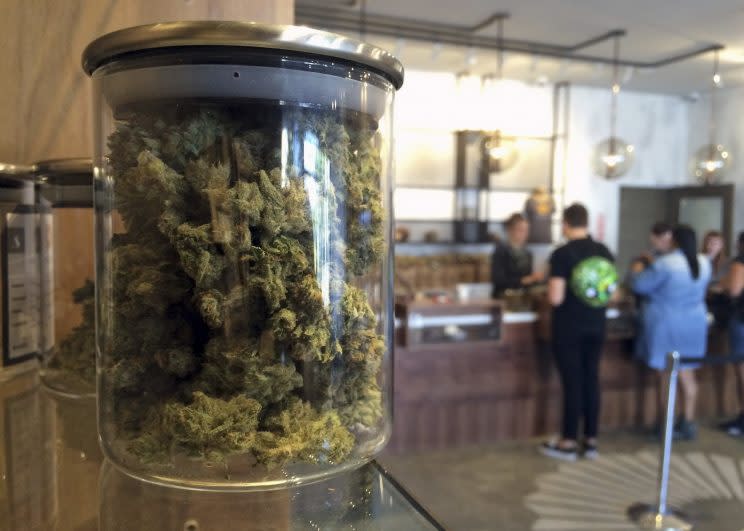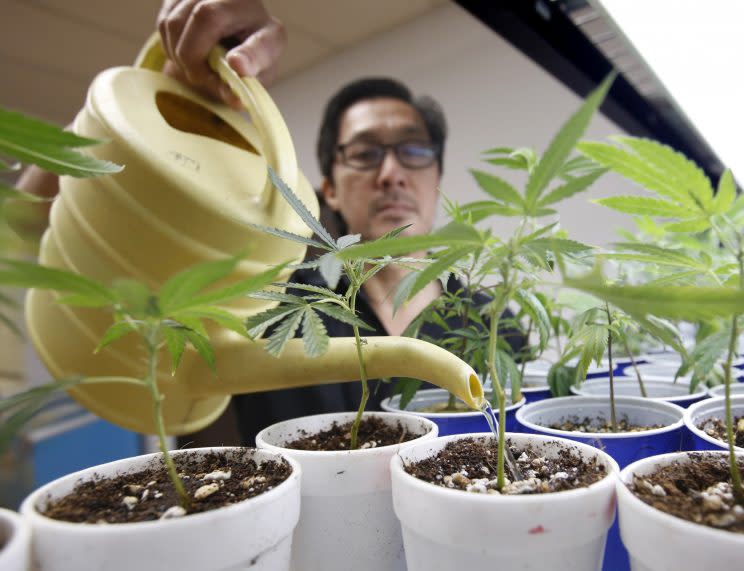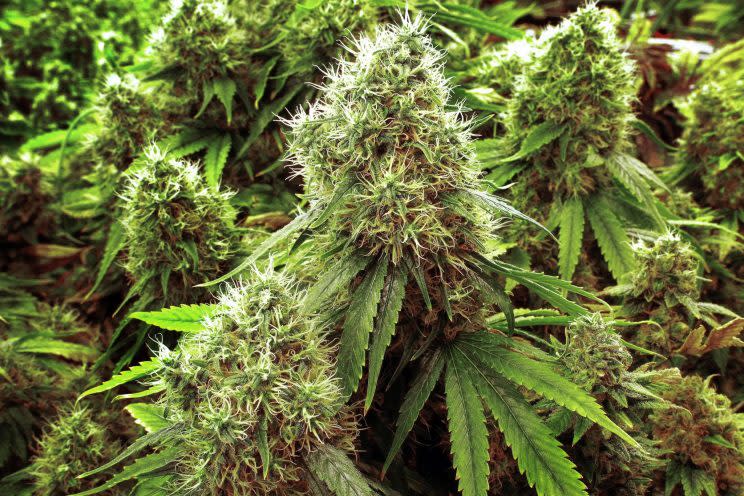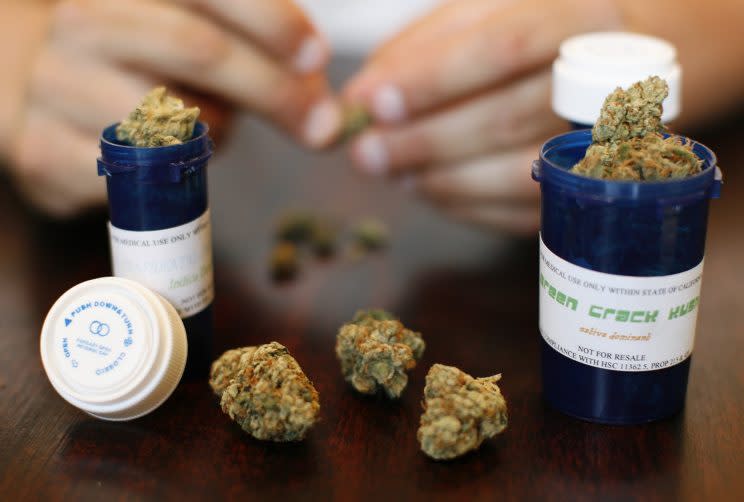DEA loosens reins on medical marijuana research, but activists want more
Groups fighting to decriminalize marijuana at the federal level were disappointed with the Drug Enforcement Administration’s announcement on Thursday that it will keep the plant in the same class of drugs as heroin — despite a growing movement calling for its outright legalization.
The Marijuana Policy Project, a group dedicated to pot policy reform in the U.S., for instance, is disappointed that the Obama administration will not remove the drug’s Schedule I classification, which is reserved for drugs with “no currently accepted medical use and a high potential for abuse.” For context, cocaine is classified as a Schedule II drug, as it can be used as a topical anesthetic.
Robert J. Capecchi, director of federal policies for MPP, said the current science clearly shows that there are medical benefits to marijuana use, but federal hurdles make it difficult for researchers to meet the criteria set forth by the federal government.
“They are looking for very specific types of research that could be produced in a replicable way,” Capecchi told Yahoo News. “Unfortunately, the research that they’re looking for was difficult if not impossible to do due to a variety of different barriers that the federal government either has or had in place.”
According to MPP, the National Institute on Drug Abuse (NIDA) has for decades blocked researchers from looking into the potential benefits of marijuana use and interfered with scientific studies that contradicted its “exaggerated claims” about the drug’s harmfulness.

But every smoke cloud has a silver lining. Along with the decision not the reclassify marijuana, the DEA announced that it would expand the number of places that are permitted to grow the drug to study its potential medical uses.
“That’s a small bit of good news and it gives us some hope,” Capecchi said. “It should go a few steps toward getting that robust research that everyone wants to see. … But the research could take years for any of this to come to fruition.”
Up until this point, scientists at the University of Mississippi were the only researchers allowed to grow marijuana for this purpose.
Other research institutions will have to go through several stages before their scientists can start testing the drug. This process includes applying for permission from the DEA, registering, setting up a cultivation center and growing the crop.
“In the meantime, while people are quite literally watching grass grow, there are individuals and businesses across this country that are acting in compliance with state law that are still under threat from federal marijuana prohibition policies,” Capecchi continued.

Rick Doblin is the founder and executive director of the Multidisciplinary Association for Psychedelic Studies, a nonprofit dedicated to raising awareness of the benefits of psychedelic substances and marijuana. According to its mission statement, the organization “develops medical, legal and cultural contexts for people to benefit from the careful uses of psychedelics and marijuana.”
“The whole petitions to reschedule were doomed to fail because the data didn’t exist. Generating the data had been blocked for 48 years. The result today is that they are getting out of the way,” Doblin said. “For all these years, we’ve been saying the politics has been blocking the science. Now let’s focus on the science.”
At least two times, Doblin said, his organization had FDA approval for medical studies but NIDA refused to sell them the marijuana because the institute did not approve of their protocol. That’s when he realized that “ending the NIDA monopoly” was a prerequisite to true marijuana reform at the federal level, he said.
“The fundamental political obstacle has today been eliminated. It’s what we’ve been working on for 17 years,” he said. “It’s a good day.”
According to NIDA, people assume they control who gets marijuana for research because they manage the University of Mississippi farm contract that provides the drug for studies. But the organization says it has provided marijuana for “every qualified research project,” that is, researchers who have their study proposal cleared and approval from the DEA and FDA.
In October 2015, the Brookings Institute, a Washington, D.C.-based think tank, released a report saying the U.S. government’s restrictions have prevented the medical community from performing the kind of medical research that’s considered the gold standard for guiding practice. This means patients are using marijuana based on limited science and adopting a “learn-as-you-go” method, according to the institute.

“The irony of the issue is that it has very little to do with marijuana. This policy problem involves medical research and scientific freedom,” John Hudak and Grace Wallack wrote in the report. “This same conversation would be had if such barriers hindered the study of morphine or diazepam or Propofol or any other drug. Yet, of all the controlled substances that the federal government regulates, cannabis is treated in a unique manner in ways that specifically impede research.”
Even the American Academy of Pediatrics, which reaffirmed its opposition to legalizing marijuana in January 2015, has called for the drug to be downgraded to Schedule II to allow more research.
This is the fourth straight time the DEA has rejected petitions to reduce the restrictions on marijuana.
Reached for comment, a NIDA spokesperson told Yahoo News that its scheduling decision was determined by the DEA.
Four states — Alaska, Colorado, Oregon and Washington — as well as the District of Columbia have already legalized marijuana for recreational and medical use. An additional 21 states have legalized medical marijuana use in some capacity.
Sen. Jeff Merkley, D-Ore., released a statement saying the federal government was doubling down on its “archaic prohibition and continuing to perpetuate an untenable status quo” while millions of voters and lawmakers across the nation are taking steps toward the legal regulation of cannabis.

“Expanding access to marijuana for research is helpful, but doesn’t solve these problems,” Merkley wrote. “It’s clear now that Congress must take action to end the confusing patchwork of state and federal laws and regulations so that businesses in states that have legalized medicinal and recreational marijuana can access banking services, additional federal research can be conducted, and Veterans Affairs doctors can finally discuss medicinal marijuana with patients.”
Mason Tvert, a spokesperson for MPP, called the DEA’s refusal to reclassify the substance mind-boggling, intellectually dishonest and completely indefensible.
“The DEA’s announcement is a little sweet but mostly bitter. Praising them for it would be like rewarding a student who failed an exam and agreed to cheat less on the next one,” Tvert said in a statement. “Removing barriers to research is a step forward, but the decision does not go nearly far enough. Marijuana should be completely removed from the CSA drug schedules and regulated similarly to alcohol.”


